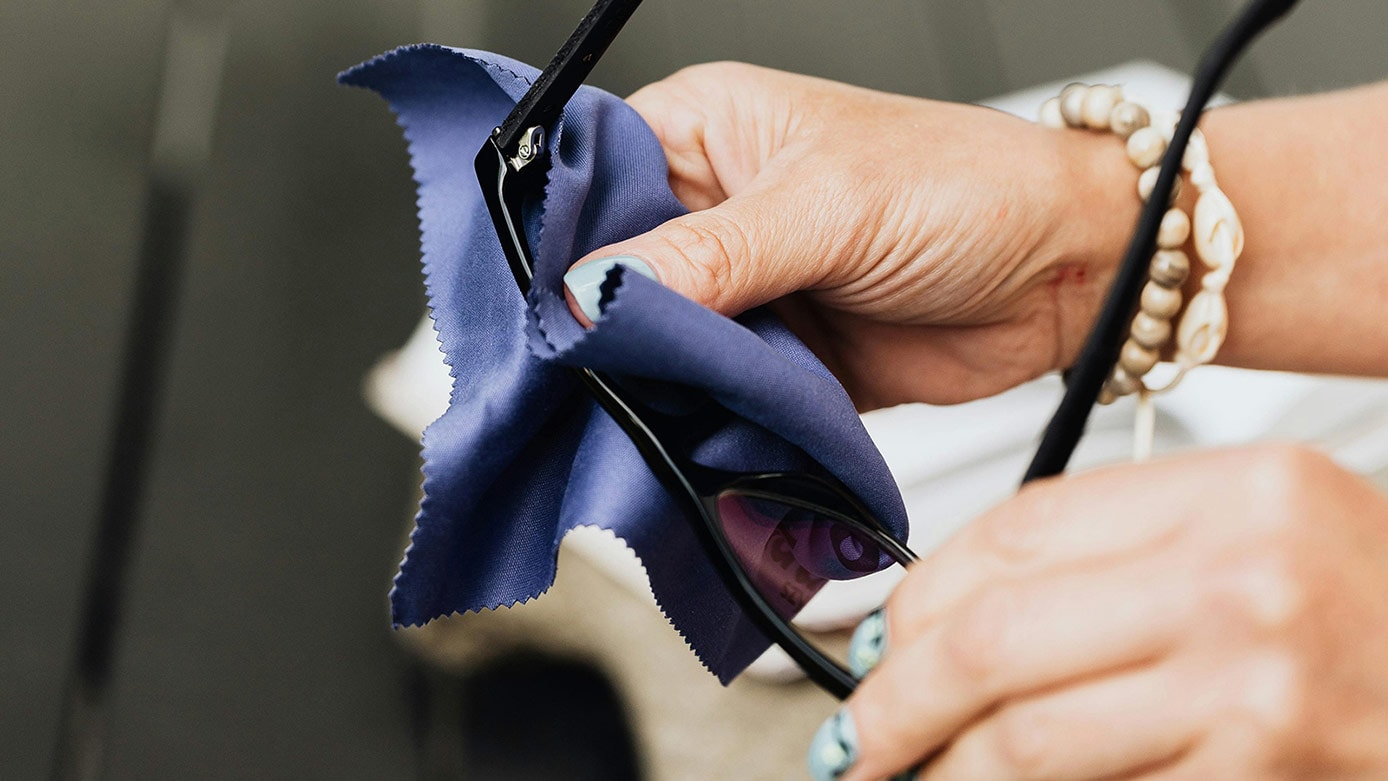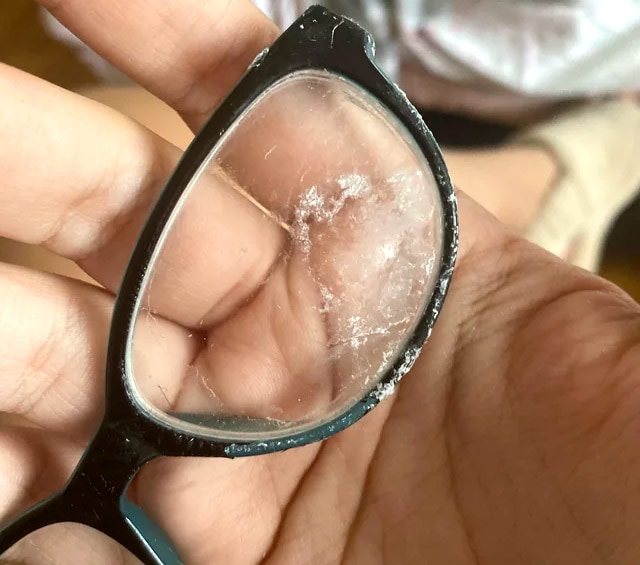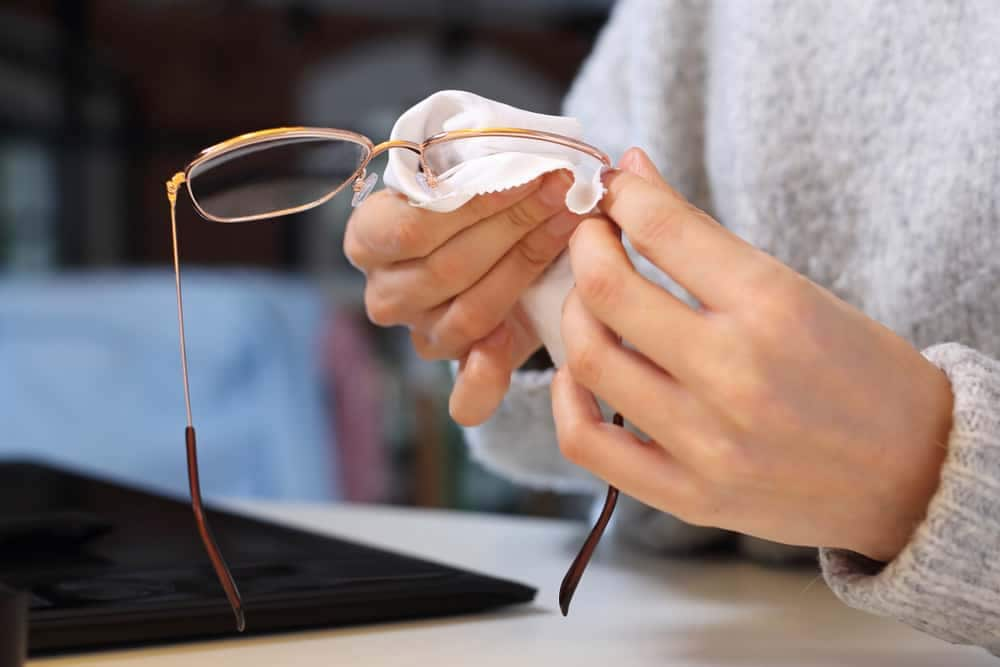Super Glue and Scratches End Up on Eyeglass Lenses
It doesn’t take much for super glue to end up on your eyeglass lenses. One of the most common scenarios is a do-it-yourself repair job, such as reattaching a loose frame hinge or a fallen-off nose pad. During these fixes, glue can easily spread to the lens surface. Accidents also happen when glasses are within reach of curious kids who may treat them as part of a craft project.

Scratches often occur just as easily. Setting glasses down on hard surfaces, cleaning them with rough materials like paper towels, or tossing them into a bag without a case can leave small marks that gradually impair vision. It is possible that even brief contact with sand or dust during cleaning can lead to permanent scratches.
Sure, it's important to know that using the wrong methods can actually make things worse. For instance, eyeglass lenses often have protective coatings like anti-glare or UV protection. These coatings can get damaged if you use harsh chemicals or abrasive tools. According to All About Vision, using household cleaners such as window sprays or ammonia can strip these coatings, causing cloudiness or reducing clarity (All About Vision, 2023).
Some eyewear professionals warn that using things like hairspray or abrasive cleaners can actually harm your lenses. Cleaning them the wrong way can leave scratches or strip off the protective coatings, which can really mess with how clear they are and how long they last (Eyeworks Eyecare, 2025).
Next time you're working on a DIY project and thinking about using glue, keep in mind that even a tiny dab or scratch might seem like no big deal, but the wrong fix can easily turn a small mistake into an unexpected trip to buy new lenses.
How to Safely Remove Super Glue from Lenses?
Let's move on to getting that super glue off your eyeglass lenses. This task takes the right tools, a steady hand, and a little patience. Skip the sharp objects and harsh chemicals—those can do more harm than good, including ruining protective coatings like anti-glare or UV filters that keep your vision sharp and your lenses lasting longer. Remember that the goal here isn’t just to get the glue off, but to do it without turning a small mess into a big problem. Now we can visit a list of recommended tools and a simple step-by-step guide to help you clean your lenses safely and keep them in great shape.

Tools You’ll Need (and Why)
- Microfiber cloth: These cloths are designed to be gentle for cleaning, and you want a gentle fabric that won’t scratch or peel coatings like tissues or paper towels might.
- Cotton swabs: Q-tips are great for targeting small areas precisely without applying too much pressure or spreading glue around and making more of a mess!
- Warm water: H₂O helps soften hardened glue, which makes it easier to lift without scraping or scrubbing.
- Mild dish soap: This breaks down oil and residue without harming lens coatings.
- Acetone-free nail polish remover <only for glass lenses>: This can be a helpful solution that can gently dissolve stubborn glue on glass surfaces. It’s less aggressive than regular acetone and won’t damage glass, but it should never be used on plastic or resin lenses.
- Lens-safe optical cleaner: Lens cleaners are formulated to clean and protect lenses without damaging anti-reflective or UV coatings.
- Plastic wrap (optional): Helps keep the warm, soapy cloth in contact with the glue for a longer period, softening it more effectively.
Step-by-Step Removal Procedure
Assess the Lens Material
You should first determine if your lenses are made of plastic, polycarbonate, or glass. Please don't take a chance that acetone and some cleaners can destroy plastic lenses or peel off coatings. If you’re unsure, always treat your lenses as plastic.
Soften the Glue
Next, soak a microfiber cloth in warm, soapy water and then lay the cloth over the glue spot for about 10–15 minutes. The heat and moisture begin to help loosen the adhesive.
Rub Gently with a Cotton Swab
After you finish soaking the glasses, gently rub the area in small circles using a cotton swab. Avoid pushing down too hard, and always remember the goal is to lift the glue gradually.
Clean with Lens-Safe Cleaner
Give the lens-safe spray cleaner a good shake, then spray it directly onto the lenses. Use a clean microfiber cloth to gently wipe them down. Experts say to steer clear of household cleaners with alcohol or ammonia—those can break down the protective coatings over time (Northeastern Eye Institute, 2023).
Glass Lenses Only: Use Acetone-Free Nail Polish Remover
For tough glue on glass lenses only, apply a small amount of acetone-free remover to a cotton swab and dab the glue spot. Wipe it clean immediately with a damp cloth to prevent it from sitting on the surface.
Final Polish
Once the glue is gone, use a dry microfiber cloth to gently polish the lens and remove any remaining smudges.
How to Properly Care for Your Lenses?
Eyeglass lenses are finely crafted tools meant to sharpen your vision and shield your eyes, often enhanced with coatings like anti-reflective or blue light filters that require extra care. Taking proper care of them doesn’t just keep things looking clear but also helps your lenses last longer.

To keep them in great condition, stick to five smart habits: Always use a lens-safe cleaner and a microfiber cloth, since things like paper towels can leave scratches. Store your glasses in a sturdy hard-shell case to prevent accidental damage. Steer clear of high heat, which can warp frames or ruin coatings; use both hands when putting on or taking off your glasses to avoid bending the frame; and don’t skip regular professional cleanings and adjustments to keep everything comfortable and working the way it should.
Let’s look at caring for your eyewear more closely:
- Use a Lens-Safe Cleaner and Microfiber Cloth
Cleaning your lenses might seem like a simple task, but the method you use matters. The safest approach is to rinse your glasses under semi-warm water to remove dust or debris, then apply a lens-specific cleaner or mild dish soap. Wipe with a clean microfiber cloth and never a paper towel, napkin, or the corner of your shirt. Normal clothes may feel soft but can scratch lenses or strip away protective coatings over time. Microfiber cloths are specially designed to lift and trap oils and particles without abrasion. - Store Glasses in a Hard-Shell Case
When glasses aren’t on your face, they’re vulnerable—whether jostling in a purse, sitting on a countertop, or tossed in a backpack. A hard-shell case cushions them from pressure and keeps sharp objects (like keys or pens) from scratching the lenses. Leaving your glasses unprotected, especially in cluttered spaces, is one of the most common ways lenses get scratched or bent. The Cleveland Clinic (2021) recommends storing glasses in a case when not in use and warns against placing lenses face down on hard surfaces. - Avoid Exposure to Heat
High temperatures can do more than just warp frames, they can actually damage lens coatings. Leaving glasses in a hot car, using hot water during cleaning, or setting them near ovens or radiators can cause bubbling, peeling, or discoloration of anti-glare and UV layers. Even short-term exposure to heat can weaken adhesive layers in multi-coating lenses, leading to visual distortion or permanent damage. Experts emphasize avoiding high heat and caution against hot water during cleaning. Always use lukewarm water instead. - Handle with Both Hands
When you are removing or putting on glasses with one hand, you may believe this is a safe method to handle your eyewear, however it gradually bends the frame, causing the arms to misalign. This leads to an uneven fit, which can affect how lenses sit in front of your eyes—reducing clarity and increasing eye strain. Using both hands ensures even pressure and helps maintain the original frame alignment.
- Get Professional Cleanings and Adjustments
Even with your careful care at home, it is important to schedule occasional checkups for your eyewear. These visits help protect the long-term durability of both your lenses and frames. Opticians can deep clean your lenses using ultrasonic tools, look for early signs of coating damage, and make precise adjustments to ensure a proper fit. Regular visits not only protect your vision quality but also help extend the life of your eyewear. The Northeastern Eye Institute (2023) recommends routine visits to maintain alignment and lens clarity, especially for glasses with prescription coatings or for people who wear them every day.
Related FAQ
Here are answers to some frequently asked questions about lens care and repair:
Will the Lens Coating Get Abrasion due to Alcoholic Content?
Alcohol can indeed harm those lens coatings if applied too much, or if the alcohol is the wrong concentration. Although lens cleaning tissues and isopropyl alcohol are recommended to clean the lens, use in small amounts and do not allow it to dry and grab on to the lens. It can also make special coatings on your lenses, like anti-reflective coating, peel or wear off over time, so it is important to not use alcohol on any specialty lenses. Only use alcohol based cleaners in moderation and follow the maintenance directions provided for your lens type by the manufacturer.
Does the toothpaste repair method work on resin lenses?
The toothpaste trick is often recommended for fixing lens damage, but it can cause more problems than it solves. Toothpaste’s abrasives can scratch resin lenses, which can ruin both their clarity and protective coatings. It might seem like an easy fix, but using the right tools or seeking professional help is always a better choice for cleaning or repairing your lenses.
Will the Repair Change My Lenses Precision?
Most repairs requiring popping out lenses or treatment with glue will not affect the accuracy of your prescription when done properly. But mishandling when doing so, the lenses can distort under pressure if not handled properly or if equipped with some hard chemicals. Lenses must be treated with a great deal of care and the right techniques should be utilized to maintain the optical properties of the lens. If the lens is severely scarred during the treatment, it may need to be replaced to maintain precise vision.
Related article: What will clean green off eyeglass frames?




















